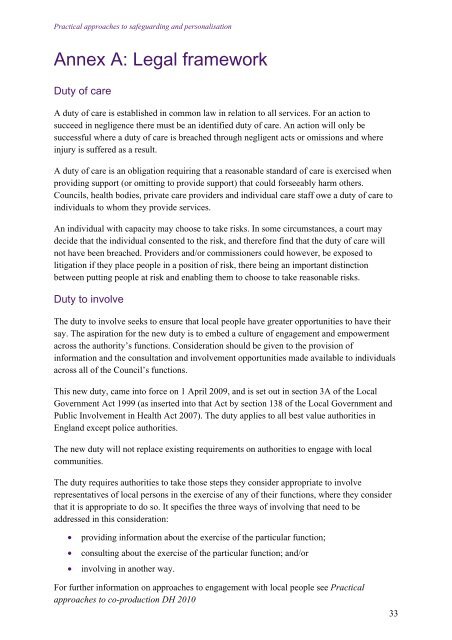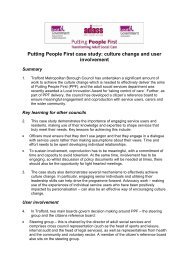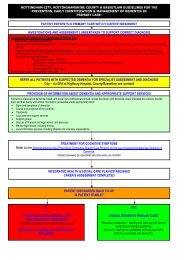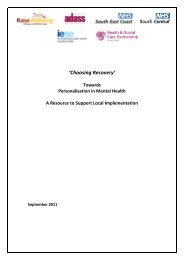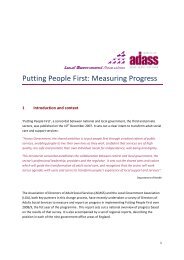Practical approaches to safeguarding and personalisation (pdf ...
Practical approaches to safeguarding and personalisation (pdf ...
Practical approaches to safeguarding and personalisation (pdf ...
Create successful ePaper yourself
Turn your PDF publications into a flip-book with our unique Google optimized e-Paper software.
<strong>Practical</strong> <strong>approaches</strong> <strong>to</strong> <strong>safeguarding</strong> <strong>and</strong> <strong>personalisation</strong><br />
Annex A: Legal framework<br />
Duty of care<br />
A duty of care is established in common law in relation <strong>to</strong> all services. For an action <strong>to</strong><br />
succeed in negligence there must be an identified duty of care. An action will only be<br />
successful where a duty of care is breached through negligent acts or omissions <strong>and</strong> where<br />
injury is suffered as a result.<br />
A duty of care is an obligation requiring that a reasonable st<strong>and</strong>ard of care is exercised when<br />
providing support (or omitting <strong>to</strong> provide support) that could forseeably harm others.<br />
Councils, health bodies, private care providers <strong>and</strong> individual care staff owe a duty of care <strong>to</strong><br />
individuals <strong>to</strong> whom they provide services.<br />
An individual with capacity may choose <strong>to</strong> take risks. In some circumstances, a court may<br />
decide that the individual consented <strong>to</strong> the risk, <strong>and</strong> therefore find that the duty of care will<br />
not have been breached. Providers <strong>and</strong>/or commissioners could however, be exposed <strong>to</strong><br />
litigation if they place people in a position of risk, there being an important distinction<br />
between putting people at risk <strong>and</strong> enabling them <strong>to</strong> choose <strong>to</strong> take reasonable risks.<br />
Duty <strong>to</strong> involve<br />
The duty <strong>to</strong> involve seeks <strong>to</strong> ensure that local people have greater opportunities <strong>to</strong> have their<br />
say. The aspiration for the new duty is <strong>to</strong> embed a culture of engagement <strong>and</strong> empowerment<br />
across the authority’s functions. Consideration should be given <strong>to</strong> the provision of<br />
information <strong>and</strong> the consultation <strong>and</strong> involvement opportunities made available <strong>to</strong> individuals<br />
across all of the Council’s functions.<br />
This new duty, came in<strong>to</strong> force on 1 April 2009, <strong>and</strong> is set out in section 3A of the Local<br />
Government Act 1999 (as inserted in<strong>to</strong> that Act by section 138 of the Local Government <strong>and</strong><br />
Public Involvement in Health Act 2007). The duty applies <strong>to</strong> all best value authorities in<br />
Engl<strong>and</strong> except police authorities.<br />
The new duty will not replace existing requirements on authorities <strong>to</strong> engage with local<br />
communities.<br />
The duty requires authorities <strong>to</strong> take those steps they consider appropriate <strong>to</strong> involve<br />
representatives of local persons in the exercise of any of their functions, where they consider<br />
that it is appropriate <strong>to</strong> do so. It specifies the three ways of involving that need <strong>to</strong> be<br />
addressed in this consideration:<br />
• providing information about the exercise of the particular function;<br />
• consulting about the exercise of the particular function; <strong>and</strong>/or<br />
• involving in another way.<br />
For further information on <strong>approaches</strong> <strong>to</strong> engagement with local people see <strong>Practical</strong><br />
<strong>approaches</strong> <strong>to</strong> co-production DH 2010<br />
33


